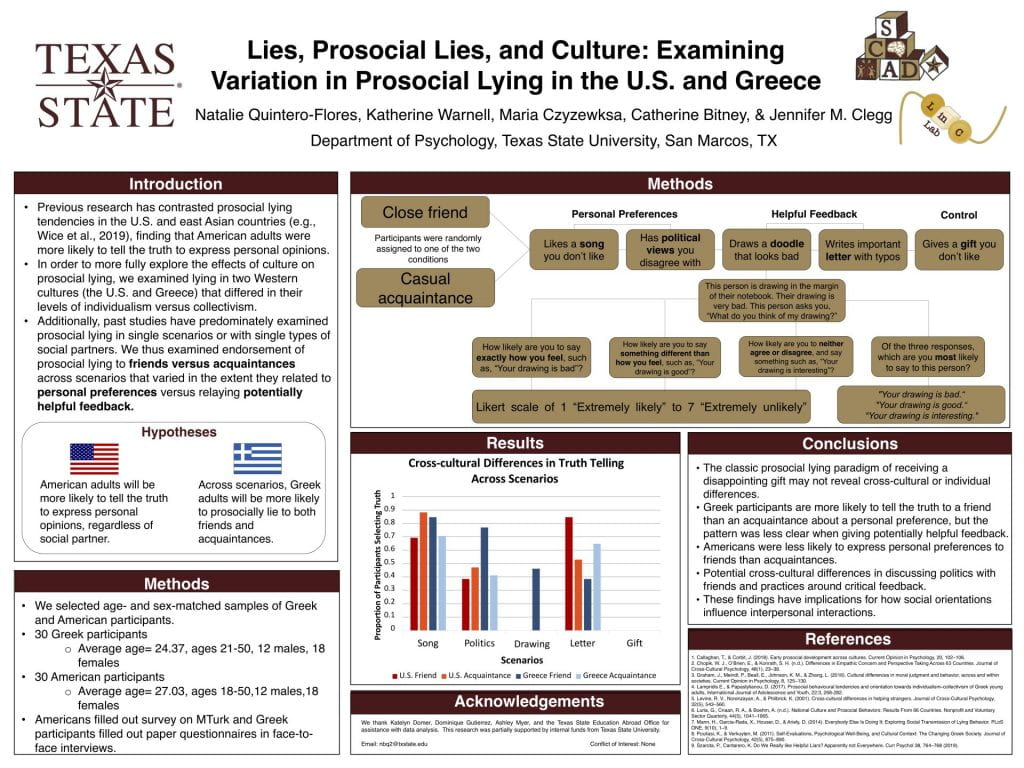Lies, Prosocial Lies, and Culture: Examining Variation in Prosocial Lying in the U.S. and Greece
Principle Author
Natalie Quintero-Flores
UnderGraduate
Co-Author(s)
Katherine Warnell, Maria Czyzewska, Catherine Bitney, & Jennifer M. Clegg
Abstract
This study investigated individuals’ likelihood to prosocially lie (i.e., tell lies to benefit others) in the U.S. and Greece. Previous research has contrasted prosocial lying tendencies in the U.S. and east Asian countries (e.g., Wice et al., 2019), finding that American adults were more likely to tell the truth to express personal opinions. We examined prosocial lying tendencies in two Western cultures that differed in their levels of individualism versus collectivism. We asked 21 U.S. participants (22-63y; a more individualist culture; Pilgrim & Rueda-Riedle, 2002) and 30 Greek participants (18-50y; a more collectivist culture; Pouliasi & Verkuyten, 2011) about their likelihood of telling the truth across a series of social scenarios that differed in the extent to which they related to personal preferences (e.g., liking or not liking a song) and relaying potentially helpful feedback (e.g., criticism of a drawing). Americans were more likely to favor telling the truth about their own preferences whereas Greeks were more concerned with the impact of their answers on others. These findings have implications for how social orientations influence interpersonal interactions.

Background: Prosocial lies are lies that are told to protect others’ feelings or make them feel better. For example, your colleague gives a presentation that they did poorly on, but when asked how they performed, you tell them they did an excellent job. In the past, cultural differences in prosocial lying have been studied in cultures such as the U.S. and Japan to draw a contrast between individualistic versus collectivist attitudes toward prosocial lying. We wanted to expand this work by studying prosocial lying tendencies in two Western populations that differed in their degrees of individualism vs. collectivism–the U.S. and Greece.
Research questions: We were interested in whether differences found in previous studies, for example that people from the U.S. tend to not lie about their personal preferences even to make others feel better, would also be present between U.S. and Greek participants. We were also interested in the impact of the social settings in which prosocial lies occur. In particular, we examined differences among two variables. The first variable was whether the information being discussed related to personal preferences versus potentially helpful feedback. For example, expressing an opinion about a song you do not like versus giving someone helpful feedback about typos in a letter that they wrote. The second variable was the impact of social partner – or who participants imagined talking to. The options for social partners in the context of the survey were either a close friend or casual acquaintance.
Hypotheses: We hypothesized, based on previous cross-cultural work, that U.S. participants would report high rates of truth telling across scenarios, regardless of social partner. We predicted in Greece, people would prosocially lie across scenarios to both social partners.
Method: The flow chart on the poster represents the survey given to participants. The survey contained 5 different social scenarios. There was one control scenario that we predicted would be similar across cultures (i.e., lying about an undesirable gift), and the remaining 4 scenarios were related to personal preferences and potentially helpful feedback. Participants were asked to answer to the scenarios as if either their close friend or casual acquaintance directly asked them a question. Participants were randomly assigned to complete either the ‘Close Friend’ or ‘Casual Acquaintance’ survey. As our dependent variable, participants were asked to rate their answers using a Likert scale (1 “Extremely likely” to 7 “Extremely unlikely”), and then choose the answer they would most likely respond with.
Results: The y-axis of the graph represents the proportion of participants that selected truth telling in the scenarios and the x-axis is the different scenarios. The red bars are the U.S. participants and the blue are the Greek participants. The dark red bar represents U.S. participant responses to friends and the light red bar represents U.S. participant responses to acquaintances. The dark blue bar represents Greek participant responses to friends and the light blue bar represents Greek participant responses to acquaintances. Our results indicate that Americans less likely expressed their preferences to their friends versus casual acquaintances. Greeks were more likely to tell the truth to their friends versus their casual acquaintances about personal preferences. There were no observed cross-cultural differences in the classical gift-giving scenario which is telling about cultural impact on prosocial lying and truth-telling. The results have implications that culture may affect how people respond to and interact with social partners.